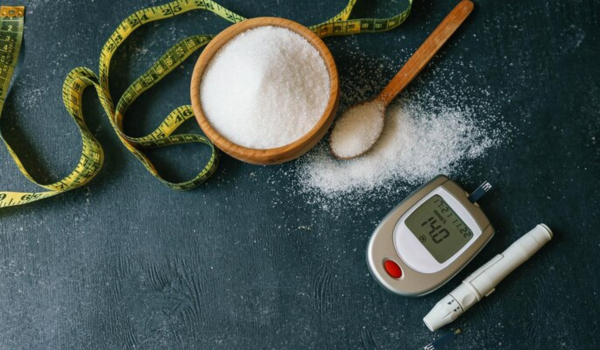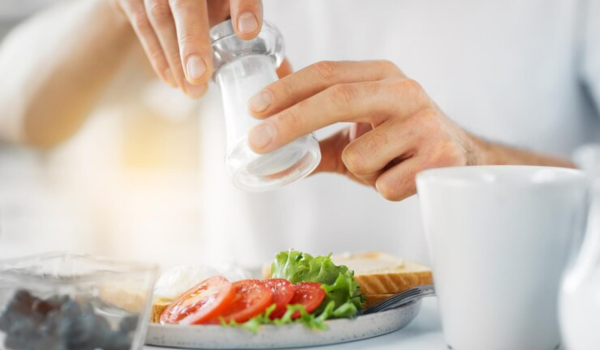Salt Water Hack for Diabetes: Does It Really Help?
Salt Water Hack for Diabetes: A Natural Remedy or Just a Trend?

Diabetes is a chronic condition that affects millions of people worldwide. Managing blood sugar levels, controlling insulin resistance, and maintaining a healthy lifestyle are crucial for preventing complications related to diabetes.
In recent years, there has been a surge of interest in natural remedies and alternative treatments for managing this condition. One of the more controversial methods gaining attention is the so-called SaltWater Hack for Diabetes.
This method claims that drinking a mixture of salt and water can help regulate blood sugar levels and improve insulin sensitivity. But is there any truth to these claims, or is this just another fad that promises too much without scientific backing?
In this blog post, we will delve into the salt water hack, examining the science behind it, the potential benefits, and the risks associated with this approach.
We’ll also explore other natural remedies for managing diabetes and provide practical tips on how to manage blood sugar effectively and safely.
What Is the Salt Water Hack for Diabetes?
The salt water hack for diabetes is a purported natural remedy that involves drinking a mixture of salt and water, often with the goal of lowering blood sugar levels and improving insulin sensitivity.
The basic premise is that the minerals in the salt, particularly sodium and potassium, can help balance blood sugar levels and support overall metabolic health.
Proponents of this method argue that it can help individuals with both Type1 and Type 2 diabetes manage their condition more effectively, without relying solely on medication.
While the concept of using salt to manage diabetes is intriguing, it’s important to understand the nuances and potential risks involved.
Salt, especially in excessive amounts, is often discouraged in the diet due to its potential to contribute to high blood pressure and other cardiovascular issues. So, what exactly makes this “hack” appealing, and is it backed by science?
The Science Behind the Salt Water Hack
At first glance, drinking salt water may seem counterintuitive to maintaining healthy blood sugar levels, especially considering that high sodium intake has been linked to high blood pressure, kidney disease, and cardiovascular issues.
However, the theory behind the salt water hack is rooted in the idea that salt’s effect on the body’s electrolytes can influence insulin and glucose regulation.
1. Electrolyte Balance and Blood Sugar Regulation
The key components of the salt water hack are sodium and potassium, two essential electrolytes that help regulate fluid balance, nerve function, and muscle contractions. Both sodium and potassium also play a crucial role in insulin function and glucose metabolism.
- Sodium: Sodium helps regulate blood pressure and fluid balance, and it plays a role in the body’s ability to respond to insulin. Some studies suggest that low sodium levels may impair insulin sensitivity, leading to higher blood sugar levels. However, excessive sodium intake can cause the opposite effect, leading to hypertension and cardiovascular strain.
- Potassium: Potassium works closely with sodium to maintain fluid balance in the body. It is also involved in insulin secretion and the regulation of glucose levels. Potassium has been shown to help improve insulin sensitivity and reduce the risk of type 2 diabetes in some individuals. This is why some proponents of the salt water hack suggest that balancing sodium with potassium could improve overall blood sugar control.
The salt water hack aims to provide a balanced amount of sodium and potassium to support these functions, but there are caveats to this approach.
The body’s electrolyte levels are finely tuned, and excessive intake of salt can disrupt this balance, leading to adverse effects on kidney function, blood pressure, and overall health.
2. Salt Water and Insulin Sensitivity
Insulin sensitivity is a measure of how effectively the body’s cells respond to insulin. In individuals with Type 2 diabetes, insulin resistance occurs when the body’s cells no longer respond to insulin as efficiently, leading to higher blood sugar levels.
Some research has suggested that sodium and potassium levels can influence insulin sensitivity, though the evidence is limited.
A study published in the American Journal of Physiology found that potassium supplementation improved insulin sensitivity in animal models of Type 2 diabetes.
This suggests that potassium plays a role in improving the body’s ability to use insulin more effectively.
However, the effects of salt (sodium) in improving insulin sensitivity are less clear, and the potential benefits of the salt water hack for managing diabetes have yet to be definitively proven in clinical trials.
3. The Role of Hydration in Diabetes Management
Proper hydration is essential for everyone, especially those managing diabetes. Dehydration can affect kidney function and blood sugar control, leading to more frequent blood sugar spikes and complications.
Drinking water, in combination with the right amount of electrolytes, can help maintain hydration and support kidney function.
While the salt water hack may theoretically help with hydration by balancing electrolytes, it’s important to consider how much salt is being consumed.
Too much salt can increase the risk of fluid retention and elevate blood pressure, which can be harmful for individuals with diabetes.
Potential Benefits of the Salt Water Hack
Despite the lack of conclusive scientific evidence, there are a few potential benefits that could explain why some people swear by the salt water hack for diabetes management. Let’s explore them:
1. Improved Hydration and Fluid Balance
- As mentioned, hydration is essential for managing diabetes. Consuming salt water may improve hydration by providing the body with electrolytes that help retain water in the cells.
- Proper hydration can also help reduce the risk of high blood sugar levels, as dehydration can lead to a concentration of glucose in the bloodstream.
- Maintaining a proper fluid balance is critical for kidney health and the regulation of blood sugar.
2. Reduced Bloating and Water Retention
- Some people with diabetes experience bloating or water retention due to the medications they are taking or due to high blood sugar levels.
- The salt water hack may help reduce this bloating by promoting better electrolyte balance.
- However, it’s important to note that the diuretic effect of salt can also lead to dehydration if not properly balanced with water intake.
3. Potential Improvement in Insulin Sensitivity
- As discussed, potassium may help improve insulin sensitivity by enhancing the body’s ability to utilize insulin.
- Some proponents of the salt water hack believe that the mix of sodium and potassium may support better blood sugar control.
- However, as of now, the effects of salt water on insulin sensitivity are not fully supported by clinical evidence.

Risks of the Salt Water Hack for Diabetes
While the salt water hack may offer some potential benefits, it’s crucial to weigh these against the potential risks. Here are some of the main concerns:
1. High Blood Pressure
- The primary concern with the salt water hack is the high sodium content, which could lead to elevated blood pressure.
- Sodium plays a significant role in regulating blood pressure, and excessive intake can increase the risk of hypertension.
- High blood pressure is particularly dangerous for individuals with diabetes, as it can lead to complications such as heart disease, kidney disease, and stroke.
2. Kidney Strain
- Excessive salt intake can put a strain on the kidneys, especially in individuals with pre-existing kidney issues or those who are prone to kidney disease a common complication of diabetes.
- Consuming too much salt may exacerbate kidney problems, leading to fluid retention, high blood pressure, and impaired kidney function.
3. Dehydration
- While salt water can help with hydration in some cases, excessive salt intake can actually lead to dehydration.
- Sodium has a tendency to draw water into the bloodstream, which can result in fluid imbalance and dehydration if not properly managed.
- This can be dangerous for people with diabetes, as dehydration can lead to higher blood sugar levels and worsen the condition.
4. Electrolyte Imbalance
- The salt water hack involves a delicate balance of sodium and potassium. Consuming too much sodium without enough potassium can lead to an electrolyte imbalance, causing symptoms like fatigue, dizziness, and muscle cramps.
- In severe cases, an electrolyte imbalance can lead to serious health problems, including arrhythmia (irregular heartbeats).
Healthier Alternatives for Managing Diabetes
While the salt water hack may have some potential benefits, it is not a reliable or safe approach to managing diabetes. Instead, here are some healthier, more evidence-based methods for controlling blood sugar levels:
- Healthy Diet: A balanced, nutrient-dense diet is essential for managing diabetes. Focus on whole foods, such as vegetables, lean proteins, whole grains, and healthy fats. Limit refined sugars, processed foods, and unhealthy fats. The Mediterranean diet, low-carb diets, and plant-based diets have all shown promise in improving blood sugar control and insulin sensitivity.
- Regular Physical Activity: Exercise plays a crucial role in managing diabetes by improving insulin sensitivity and helping the body utilize glucose more efficiently. Aim for at least 150 minutes of moderate-intensity exercise per week, which can include walking, swimming, cycling, or resistance training.
- Blood Sugar Monitoring: Regularly monitoring your blood sugar levels is essential for understanding how your body responds to different foods, activities, and medications. This helps you make informed decisions about your diet and lifestyle and allows you to catch any potential blood sugar spikes or drops early.
- Consultation with Healthcare Professionals: It’s always best to work closely with a healthcare professional when managing diabetes. A doctor, endocrinologist, or registered dietitian can help tailor a diabetes management plan that works best for you, taking into account your individual needs and preferences.
Conclusion
The salt water hack for diabetes may sound appealing, but it’s important to approach it with caution.
While the combination of sodium and potassium may have some impact on hydration and insulin sensitivity, the risks of high sodium intake, such as high blood pressure and kidney strain, outweigh the potential benefits.
There is no conclusive evidence to suggest that the salt water hack is an effective or safe method for managing diabetes.
Instead, focus on proven strategies like maintaining a balanced diet, staying active, monitoring blood sugar levels, and working with healthcare professionals to create a personalized diabetes management plan.
By making sustainable, healthy lifestyle choices, you can effectively manage your diabetes and improve your overall well-being.
.